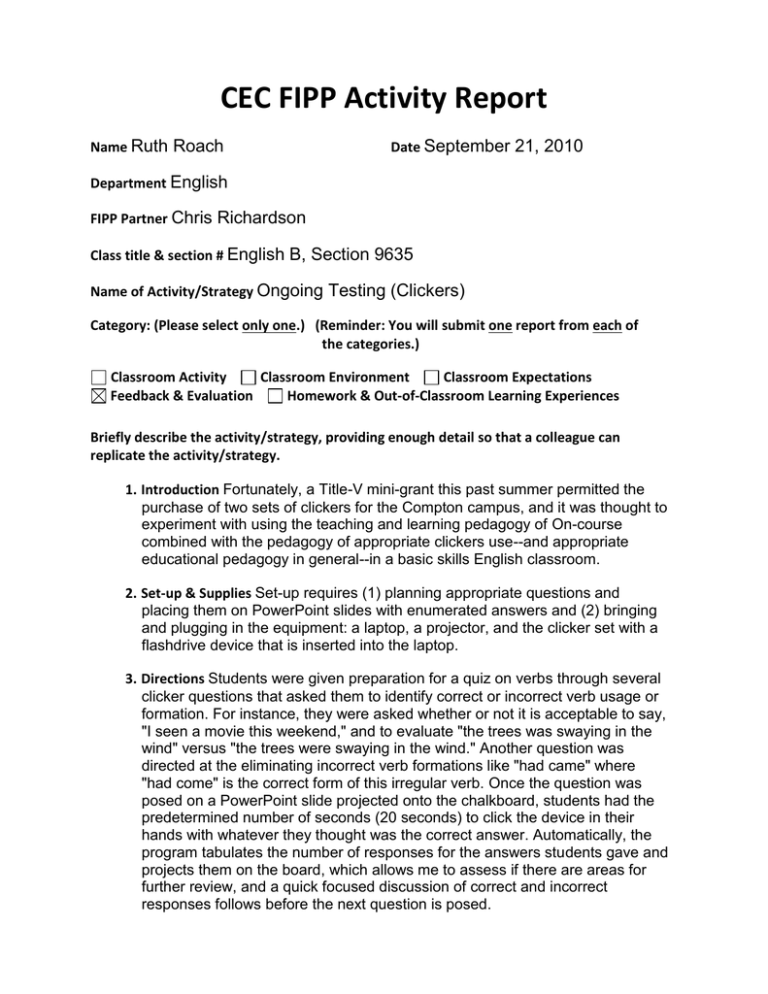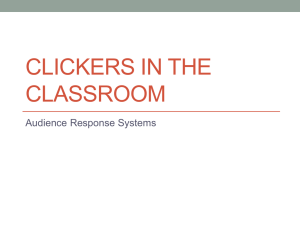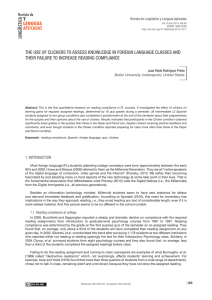Clickers
advertisement

CEC FIPP Activity Report Name Ruth Roach Date September 21, 2010 Department English FIPP Partner Chris Richardson Class title & section # English B, Section 9635 Name of Activity/Strategy Ongoing Testing (Clickers) Category: (Please select only one.) (Reminder: You will submit one report from each of the categories.) Classroom Activity Classroom Environment Classroom Expectations Feedback & Evaluation Homework & Out-of-Classroom Learning Experiences Briefly describe the activity/strategy, providing enough detail so that a colleague can replicate the activity/strategy. 1. Introduction Fortunately, a Title-V mini-grant this past summer permitted the purchase of two sets of clickers for the Compton campus, and it was thought to experiment with using the teaching and learning pedagogy of On-course combined with the pedagogy of appropriate clickers use--and appropriate educational pedagogy in general--in a basic skills English classroom. 2. Set-up & Supplies Set-up requires (1) planning appropriate questions and placing them on PowerPoint slides with enumerated answers and (2) bringing and plugging in the equipment: a laptop, a projector, and the clicker set with a flashdrive device that is inserted into the laptop. 3. Directions Students were given preparation for a quiz on verbs through several clicker questions that asked them to identify correct or incorrect verb usage or formation. For instance, they were asked whether or not it is acceptable to say, "I seen a movie this weekend," and to evaluate "the trees was swaying in the wind" versus "the trees were swaying in the wind." Another question was directed at the eliminating incorrect verb formations like "had came" where "had come" is the correct form of this irregular verb. Once the question was posed on a PowerPoint slide projected onto the chalkboard, students had the predetermined number of seconds (20 seconds) to click the device in their hands with whatever they thought was the correct answer. Automatically, the program tabulates the number of responses for the answers students gave and projects them on the board, which allows me to assess if there are areas for further review, and a quick focused discussion of correct and incorrect responses follows before the next question is posed. What worked well? Students discovered which questions they answered correctly and, therefore, knew well, in preparation for the quiz. At the same time, when I asked if they were now ready for the quiz, several said, "no," and I then was able to redirect their new self-awareness in a positive direction to the study of the pertinent flashcards on verb tenses. Students were told to review these flashcards in pairs, which renewed their group interaction and commaraderie--interdependence in this "high stakes" task of quiz preparation where they had each other to perform the preparatory flashcard quizzing. What would you change? I usually like to have a pre-test and post-test, but have been running a bit behind schedule due to the insertion of the On-course activities on day one, ironically (time well-spent, nonetheless). We caught-up that day, but scores on the "official" quiz that followed on the same day showed a majority "got it," but more would have perhaps benefited with the typical combination of pre-test and post-test and/or questioning throughout the lecture, which would typically be done. Would you use the activity/strategy again? Why or why not? Yes, I would definitely use the strategy for feedback and informal or formative evaluation. One reason is that students were surveyed about (1) their liking of clickers and (2) whether or not clickers helped them learn, in the summer grant-sponsored pilot, with high favorability for both (74% on first question and 97% on second question). Additionally, the students were surveyed that day and also responded favorably to clickers in class. Requested additional clicker sets on campus for faculty use are awaited. Please describe any student learning and/or changes that you observed after the implementation of the activity/strategy. As mentioned earlier, I liked that if students were not prepared, they were aware of it and studied with focused attention on relevant material to improve their skills. In my view, this is empowering them with the information about their individual skill level--and in a non-intimidating way, as a student in the summer pilot commented. Furthermore, it is empowering them in their own education, once they have that information about their skill level, to take the next steps necessary to improve those skills and seek answers in the right places within class materials, including also using each other for stimulation and as a resource.



